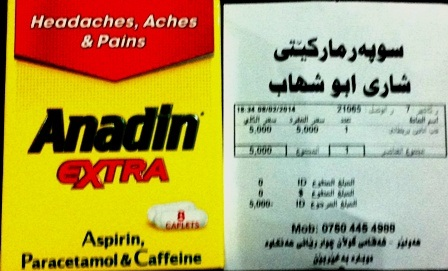8.6.2014
Talib
Murad
On Tuesday evening (3rd
June) I went to shop in the Majdy shopping mall in Erbil. This complex has a
hypermarket and many brand name outlets as well but I was shopping for food and
household goods. Whenever, and wherever, I shop for food products I check the
expiry date of the product, manufacture’s details and of course the price. I
found that as usual the cost of food was inflated especially the cost of
imported food products. Perhaps it is no surprise to know that in Kurdistan
there is no organization that deals with consumer protection apart from the
government’s checks with regard to the cleanliness of restaurants and the
expiry dates of food and of course most of the food products on sale here are
imported.
When I went to the
checkout there was only one young Kurdish boy working there and the rest of the
staff were of Indian nationality and this prompted me to go through the
checkout where the young Kurd was working and to ask a few questions. I simply
asked him what was the ratio of Kurdish to non –kurds and foreign shoppers
using the supermarket? He called to another Kurd working in the shop to come
and answer the query. Between them they told me that only 4 out of every 10
customers are Kurds and the remainder from southern Iraq . They laughed and
told me that the number of Kurds using the market had dropped because, as
everyone knows, no salaries had been paid in Kurdistan for the last three months
and only those from the south or elsewhere had money to spend.
I went into several of the brand name outlets,
such as Levi, Clarks and Adidas where I discovered that there was only one
Kurdish salesman and the rest were from south Iraq. In addition theses people
told me that only two out of ten of their customers are Kurds. The difference
for these outlets is not only due to the fact that so many Kurds have not received
a salary in recent months but that those who are rich enough go to Europe and
elsewhere to obtain their goods.
This lack of Kurdish
shoppers is a direct result of the disruption to regular salary payments to so
many Kurds over the last five months and another sector that reflects the
result of this is the building trade. Since the beginning of 2014 the building
sector has seen monthly trade drop to only 25% of last year’s figures.
 |
| In Kurdistan 8 Capsules sold for 5000 ID=2.50 Pounds |
I have lived in many
developing countries and have never seen such an inflation of costs in a
peaceful country. Here traders can obtain land for business use by simply going
to the governmental authorities, taxes are low (if there are any), they do not
have to meet insurance costs and readily employ the cheap labour of the poor
from Nineveh, Syria and Iran so I wonder just how high their profits can be in
a market that is just a free for all. There needs to be a consumer
protection agency that monitors not only food quality but ensures that fair
prices are charged for goods here.
 |
| Bills given to consumers with foreign languages |
Around six years ago, when Mr. Adnan Mufti was
Speaker of the KRG parliament, a law was about to pass to protect consumer
rights but as yet nothing has been done to finalized this law.
We desperately need
action to be taken to enforce legal protection of consumers’ rights and, in
addition, payment of long overdue salaries to stimulate the stagnant economy.


No comments:
Post a Comment